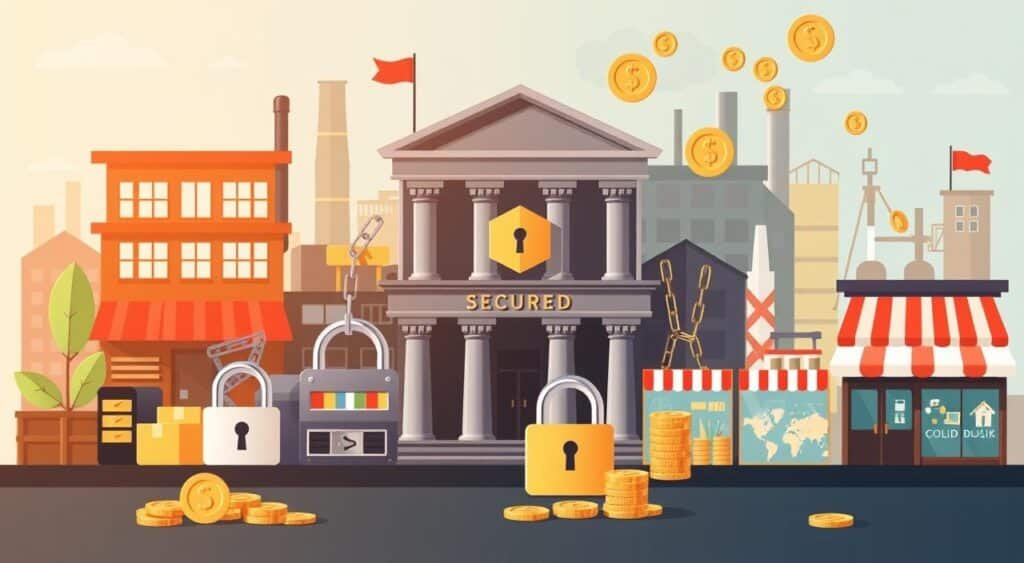Getting a Secured business loan is key for small businesses to grow. Secured loans need collateral, like cash or real estate. This makes the loan safer for lenders, which can mean better rates and terms.
To apply, first check if you qualify and how much you need. Look at your credit score and business finances. Also, think about what collateral you have.
Then, pick the right collateral for your loan. This could be equipment, vehicles, or even inventory. Lenders will check the value of your collateral. They might ask for more if it’s not enough.
After choosing your collateral, compare different lenders. Look at banks, online lenders, and the Small Business Administration (SBA). Consider interest rates, loan amounts, and how you’ll pay back the loan.
When you pick a lender, start the application. You’ll need to provide financial documents like tax returns. Lenders will use this to decide on your loan terms.
By following these steps, you can get the financing you need. This can help your business grow and succeed.
Key Takeaways
- Secured business loans require collateral, which can reduce lender risk and provide better loan terms.
- The application process involves reviewing qualifications, choosing collateral, comparing lenders, and gathering documentation.
- Lenders evaluate the value of the collateral and may require additional collateral or a higher down payment.
- Secured business loans can be obtained from banks, online lenders, and the SBA, with various loan options available.
- Careful consideration of loan terms, interest rates, and repayment schedules is essential when applying for a secured business loan.
Understanding Secured Business Loan Fundamentals
Secured business loans are a strong financing option. They differ from unsecured loans, which rely only on your credit score. Secured loans use business assets as collateral, offering a guarantee to lenders.
What Makes a Business Loan Secured?
The main difference is the need for collateral. Lenders accept many types of collateral, like cash, real estate, and equipment. This collateral makes lenders feel secure, allowing them to offer lower interest rates and larger loans.
Types of Collateral Accepted by Lenders
- Cash and investment accounts
- Invoices and accounts receivable
- Commercial real estate and property
- Business equipment and vehicles
- Inventory and raw materials
- Personal assets like homes, art, or jewelry
Benefits of Choosing a Secured Loan
Secured business loans have several benefits:
- Lower interest rates – These loans often have lower rates because they’re less risky for lenders.
- Higher loan amounts – With collateral, lenders are more likely to give out bigger loans.
- Easier qualification – You might need a lower credit score and income to qualify.
But, remember, there’s a big risk. If you can’t pay back the loan, you could lose your collateral.
Qualifying Requirements for a Secured Business Loan

Getting a business loan means you must meet certain criteria. Important factors include your business credit, personal credit scores, annual revenue, time in business, and why you need the loan. Lenders often look for a minimum revenue, which is usually lower for secured loans than for unsecured ones.
A good credit score is key. It can help you get approved for more money and lower interest rates. They also check your business plan and how you plan to pay back the loan. Sometimes, they might ask for extra security, like a UCC lien or a personal guarantee.
- Typical credit score requirement: 690 or higher for government-backed SBA loans and traditional bank small-business loans
- Some online lenders accept a minimum personal credit score as low as 500 for business loans
- Annual revenue requirement: $100,000 for OnDeck’s line of credit, $250,000 for Bank of America’s secured business loans
- Debt service coverage ratio typically expected to be higher than 1.25, indicating sufficient cash flow to cover debt obligations
- Minimum of two years in business often required by banks and SBA lenders
To get a secured business loan, you must meet the lender’s criteria. You’ll need to provide financial statements, tax returns, and details about your collateral. Knowing these requirements can help business owners get the financing they need to grow.
Preparing Your Secured Business Loan Application

Getting a business loan can help your company grow. But, you need to prepare well for the application. Knowing what documents you need is key.
Essential Documentation for Application
To apply for a secured business loan, you’ll need to gather a lot of information. This includes your business’s name, address, and Employer Identification Number (EIN). Also, a detailed business plan is important. It should outline your goals, strategies, and financial plans.
Business Financial Statements
Lenders will look closely at your business’s finances. You’ll need to provide profit and loss statements, tax returns, and bank statements. These show you can repay the loan and handle your finances well.
Collateral Documentation Requirements
Secured loans need type of collateral as security. You must document the assets you’ll use as collateral. This includes details on ownership, value, and condition. Sometimes, an independent auditor is needed to check the value of the collateral.
Applying for a secured business loan takes more time and effort than unsecured loans. But, with the right preparation, you can get the funding your business needs to succeed.
| Required Documentation | Purpose |
|---|---|
| Business Information (name, address, EIN) | Identify the applicant and business |
| Detailed Business Plan | Demonstrate business strategy and financial projections |
| Financial Statements (P&L, tax returns, bank statements) | Assess financial health and ability to repay the loan |
| Collateral Documentation (ownership, value, condition) | Provide details on the type of collateral securing the loan |
“Securing a business loan can be a transformative step, but it requires meticulous preparation to present a compelling case to lenders.”
Comparing Different Types of Secured Business Loans

There are many secured business loans to choose from when financing your business. Each loan has its own benefits and fits different needs and financial situations.
SBA Loans
SBA loans are backed by the U.S. Small Business Administration. They offer long repayment terms and low interest rates, from 4% to 13%. You can use them for expansion, equipment, or real estate investments.
Business Term Loans
Business term loans give you a lump sum for various needs. They require collateral, like equipment or real estate, and have interest rates from 5% to 25%.
Equipment Financing
Equipment financing is for buying business equipment. The equipment itself is used as collateral. Interest rates range from 4% to 40%.
Business Lines of Credit
A business line of credit offers flexible funding for short-term needs. It provides access to funds from $10,000 to $1 million. Interest rates can be from 7% to 25%.
Commercial Real Estate Loans
Commercial real estate loans help buy or refinance business properties. They are secured by the property and have interest rates from 5% to 30%.
Invoice Financing
Invoice financing lets you access up to 85% of outstanding invoices. It uses the invoices as collateral. This loan provides quick cash flow management.
When comparing secured business loans, think about your needs, collateral, and lender terms. Each loan has unique features and benefits. By understanding these, you can choose the best loan for your business.
| Loan Type | Typical Loan Amounts | Interest Rates | Repayment Terms |
|---|---|---|---|
| SBA Loans | Up to $5 million | 4% to 13% | 5 to 25 years |
| Business Term Loans | $25,000 to $500,000 | 5% to 25% | Varies |
| Equipment Financing | Cost of equipment | 4% to 40% | Typically matching the equipment’s useful life |
| Business Lines of Credit | $10,000 to $1 million | 7% to 25% | Revolving |
| Commercial Real Estate Loans | Varies | 5% to 30% | 5 to 25 years |
| Invoice Financing | Up to 85% of outstanding invoices | Varies | Typically short-term |
Each secured business loan has its own terms and best-use scenarios. By evaluating your business needs and financial situation, you can find the right loan for your goals and financing terms.
Also Read: Branch Insurance: Protect Your Business’s Branches Today
Conclusion
Applying for a secured business loan means knowing the basics, meeting the requirements, and preparing well. You also need to compare different secured loan options. Secured loans can offer lower interest rates and higher borrowing limits. But, there’s a risk of losing the collateral if you can’t repay the loan.
Deciding on a secured business loan should be thoughtful. You need to look at your business’s finances, growth plans, and repayment ability. Getting ready with the right documents and knowing the pros and cons can help get your loan approved. This way, you can find the best financing for your business.
Getting a secured business loan and preparing your loan application needs careful thought. Understanding the basics and preparing well can improve your chances of getting the loan you need. This can help your business grow and succeed.
FAQs
Q: What is a secured business loan?
A: A secured business loan is a type of loan that is backed by collateral, such as business assets. This means that if you default on the loan, the lender may claim the collateral to recover their losses.
Q: What are the pros and cons of secured business loans?
A: The pros of secured business loans include lower interest rates and higher borrowing limits due to the collateral provided. However, the cons of secured business loans include the risk of losing your business assets if you default on the loan.
Q: How can I get a secured business loan?
A: To get a secured business loan, you need to approach lenders offering this type of loan. You will need to provide information about your business, your credit score, and the collateral you are willing to offer.
Q: What are the cons of secured business loans?
A: The cons of secured business loans include the requirement to provide collateral, which can be a risk if you can’t repay your loan. Additionally, the loan agreement may have stringent terms that could affect your cash flow.
Q: How do secured business loans compare to unsecured business loans?
A: Secured business loans require collateral, while unsecured business loans do not. Because of this, secured loans often have lower interest rates and higher borrowing limits, whereas unsecured loans may be easier to qualify for but can come with higher rates.
Q: What types of collateral can I use for a secured business loan?
A: Common forms of collateral for a secured business loan include business assets such as real estate, equipment, inventory, or accounts receivable. The value of the collateral typically influences the loan amount you can secure.
Q: Can I qualify for a secured business loan with a low credit score?
A: While a low credit score can make it challenging to qualify for a secured business loan, having valuable collateral may improve your chances. Lenders may consider the type of business and the potential for repayment when evaluating your application.
Q: What is the typical interest rate for secured business loans?
A: The interest rate for secured business loans varies depending on the lender, the type of loan, and the risk associated with the borrower. Generally, rates are lower compared to unsecured loans due to the reduced risk for lenders.
Q: How do I repay my secured business loan?
A: Repayment of a secured business loan typically follows a loan payment schedule outlined in the loan agreement. Payments may be made monthly, quarterly, or annually, depending on the terms negotiated with the lender.





